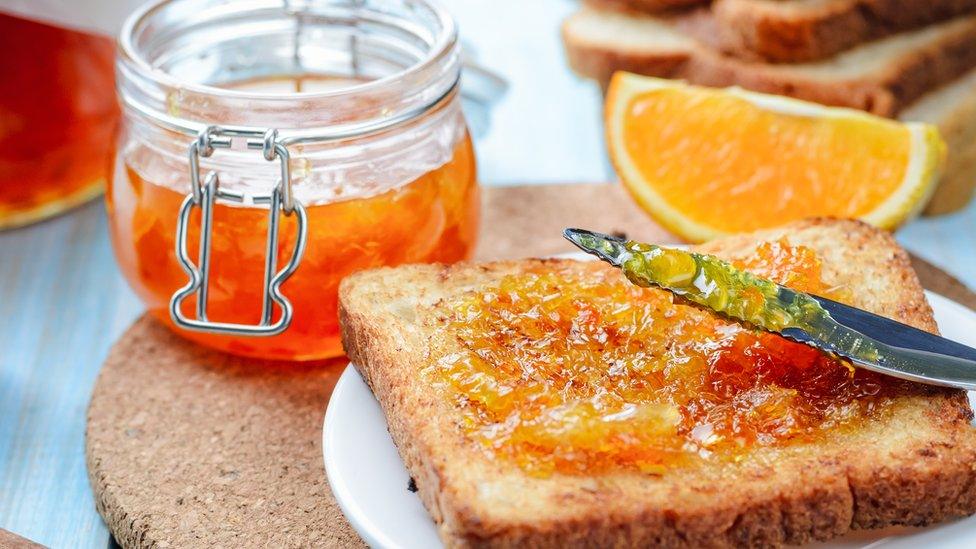George Orwell gets food essay apology from British Council after 70 years
- Published

Animal Farm writer George Orwell died in 1950
It seems even the best of writers get rejected - but not all of them can expect an apology 70 years later.
The British Council has apologised to George Orwell after rejecting an essay of his seven decades ago.
The author of 1984 and Animal Farm wrote the piece, entitled British Cookery, external, in 1946.
But the council, which promotes British relations with other countries, told Orwell it would be "unwise to publish it for the continental reader".
Hot drinks
The editor acknowledges it is an "excellent" essay, but "with one or two minor criticisms" - including that Orwell's recipe for orange marmalade contained "too much sugar and water".
In the essay, Orwell describes the British diet as "a simple, rather heavy, perhaps slightly barbarous diet" and where "hot drinks are acceptable at most hours of the day".
Alasdair Donaldson, British Council senior policy analyst, said: "It seems that the organisation in those days was somewhat po-faced and risk-averse, and was anxious to avoid producing an essay about food (even one which mentions the disastrous effects of wartime rationing) in the aftermath of the hungry winter of 1945."
He added: "Over 70 years later, the British Council is delighted to make amends for its slight on perhaps the UK's greatest political writer of the 20th Century, by re-producing the original essay in full - along with the unfortunate rejection letter."

Orwell's orange marmalade recipe

This time of year is perfect for making marmalade. For just a short few weeks, Seville oranges are in season.
The strong bitter fruits are a far cry from the sweet oranges we're used to, and are the secret behind marmalade's distinctive tang.
Here is Orwell's take, external on a classic - but beware, according to his editor's tastes, it's a "bad recipe!".
Ingredients:
2 seville oranges
2 sweet oranges
2 lemons
8lbs (3.6kg) of preserving sugar
8 pints (4.5 litres) of water
Method. Wash and dry the fruit. Halve them and squeeze out the juice. Remove some of the pith, then shred the fruit finely. Tie the pips in a muslin bag.
Put the strained juice, rind and pips into the water and soak for 48 hours. Place in a large pan and simmer for an hour and a half until the rind is tender. Leave to stand overnight, then add the sugar and let it dissolve before bringing to the boil.
Boil rapidly until a little of the mixture will set into a jelly when placed on a cold plate. Pour into jars which have been heated beforehand and cover with paper covers.

According to Orwell's essay, breakfast for most people in Britain is "not a snack but a serious meal" that consists of three courses.
At the end of the meal comes bread, or toast, with orange marmalade. "Other kinds of jam are seldom eaten at breakfast, and marmalade does not often appear at other times of the day," he writes.
Tea is the preferred drink with which to wash breakfast down, since "coffee in Britain is almost always nasty".
Of tea, British people "are extremely critical, and everyone has his favourite brand and his pet theory as to how it should be made".
"The British are great eaters of pickles," but "as for vegetables, it must be admitted they seldom get the treatment they deserve", he writes.
"Cabbage is simply boiled - a method which renders it almost uneatable - while cauliflowers, leeks and marrows are usually smothered in a tasteless white sauce."
The writer says high tea in 1940s Britain consisted of a variety of savoury and sweet dishes, but "no tea would be considered a good one if it did not include at least one kind of cake".
"A particularly delicious kind of tea cake, made to be toasted and buttered, is the crumpet, which is unsweetened and is eaten with salt," he continues.
"Crumpets, which are of very strange appearance - they are white, and full of holes like a Gruyere cheese - are made by a process that is known to very few people."